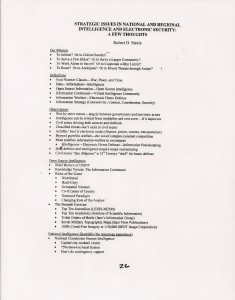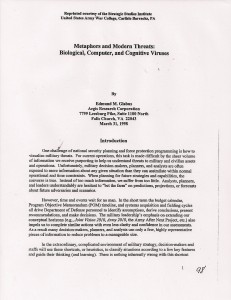
1998 Hughes (US) Foreign Broadcast Information Service (FBIS) 1995-1998: Transition and Transformation
Government, Historic Contributions
The presentation by Kenneth Hughes of the Foreign Broadcast Information Service (FBIS) is historic in large part because it is the single instance of FBIS taking the rest of the world seriously. In its new incarnation it deals with 11 countries and ignores the other 79 known to have Open Source Intelligence (OSINT) capabilities. Mr. Hughes' speech abstract is provided below.
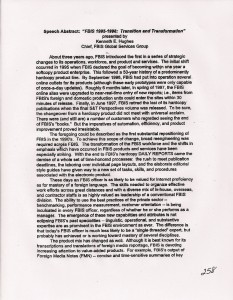
In fairness to FBIS/OSC, it is not possible for those good people trapped in a bad system to overcome the cultural, historical, legal, linguistic, and security constraints they are forevermore imbued with. As can be seen by clicking on the FBIS logo, the “OSINT” that is produced is generally classified and always restricted to US Government employees and contractors.
This is one reason the Smart Nation Act provides for a separation between open source intelligence elements that serve the secret world alone, and open source intellience elements, such as those of the Departments of Commerce, Defense, Energy, and State, that understand the vital importance of being able to share information and make sense on a multinational multicultural basis in 183 languages FBIS cannot get a grip on.
We advocate a Civil Affairs proponency role for OSINT “outside the wire,” and military J-2 proponency for “inside the wire” inter-agency and coalition information-sharing and sense-makingf.
1998 Mti (ZA) Open Source Intelligence, the African Renaissance, and Sustainable Development: the Emerging National Intelligence Model for South Africa
Collaboration Zones, Government, Historic Contributions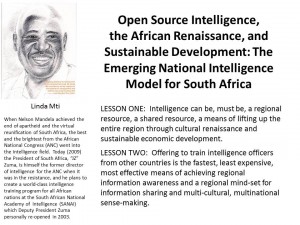
When Nelson Mandela achieved the end of aparthied and the virtual reunification of South Africa, the best and the brightest from the African National Congress (ANC) went into the intelligence field. Today (2009) the President of Souith Africa, “JZ” Zuma, is himself the former director of intelligence for the ANC when it was in the resistance, and he plans to create a world-class intelligence training program for all African nations at the South African National Academy of Intelligence (SANAI) which Deputy President Zuma personally re-opened in 2003. Below are the planned remarks of Mr. Mti, then serving as Coordinator for Intelligence in the Office of the President.
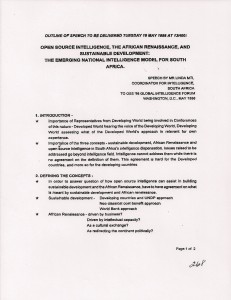
1998 Schlickmann (DE) Ensuring Trust and Security in Electronic Communication
Commerce, Government, Historic Contributions, Technologies, Threats
We would never have gotten a Commissioner from the European Union without the help of Madame Judge Danielle Cailloux, investigative judge and lead oversight entrepreneur for the Belgian intelligence community. Many do not realize that information is like a work of art, and its provenance and security are vital to its INTEGRITY. Europe has been far ahead of the USA in its mindfulness of the value of regulation that combines integrity and insight.
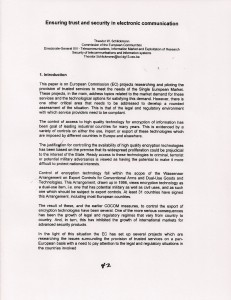
1998 Steele (US) Strategic Issues in National and Regional Intelligence and Electronic Security: A Few Thoughts
Briefings & Lectures, Collaboration Zones, Communities of Practice, Strategy1998 Steele (US) Open Source Intelligence: An Orientation for Law Enforcement Professionals
Briefings & Lectures, Law EnforcementThe below outline was created for a special meeting of the top law enforcement officers in Australia during the October 1998 event organzed by then LtCol Ian Wing AU, today a Colonel and a PhD to boot. He and Paul Roger, along with Winston Maiki (RIP) and Babette Bnesousson are the leaders in Australia.
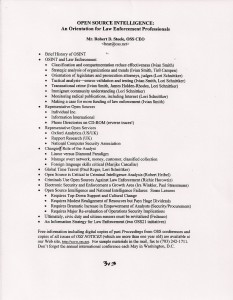
1998 Open Source Intelligence: Private Sector Capabiltiies to Support DoD Policy, Acquisition, and Operations
Articles & Chapters, Articles & Chapters, Military, Reform, TechnologiesThe below reference and article was drafted by Robert Steele with some editorial assistance from Mark Lowenthal, who was briefly an employee of OSS before jumping to SRA International. The article draws on the experience of the Marine Corps Intelligence Center (MCIC) that was established by General Al Gray, USMC, then Commandant of the Marine Corps, largely to support expeditionary acquisition. The Army, the Navy, and the Air Force are all “big system” services, and while the Army has begun to learn how to “eat the tail” and reduce the logistics footprint (as well as the ground convey exposure and expense), the reality is that DoD acquisition remains totally hosed today, and 20,000 new people (as planned by Secretary of Defense Robert Gates) are not going to be effecive for three reasons:
1. DoD makes policy without regard to strategy or intelligence
2. DoD acquires systems without regard to strategy, lacking a strategic analytic model
3. DoD is long over-due for massive changes to Title 109 such that we have four proponents for Big War, Small War, Peace War, and Homeland Defense (each of the Services could be redirected appropriately) but–big but–the regional combatant commanders become BOTH the hubs for Whole of Government inter-agency planning, programming, and budgeting AND the primary proponents for what is needed in their theaters.
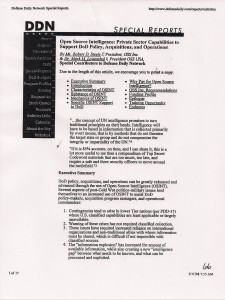
Should it not be crystal clear, the “butts in seats” approach in which contractors cost the taxpayer 250% of their salary is not sanctioned by this early article on how to fix intelligence support to acquisition. Small cells, a global grid of multinational sharing and sense-making partners, and the ability to “know who knows,” to apply strategic analytic tradecraft, and to produce “just enough, just in time, just right” Open Source Intelligence (OSINT) that either stands on its own or radically enhances all-source intelligence production, are the way to go. No one now providing OSINT under OMB Code M320 understaqnds how to do that.

